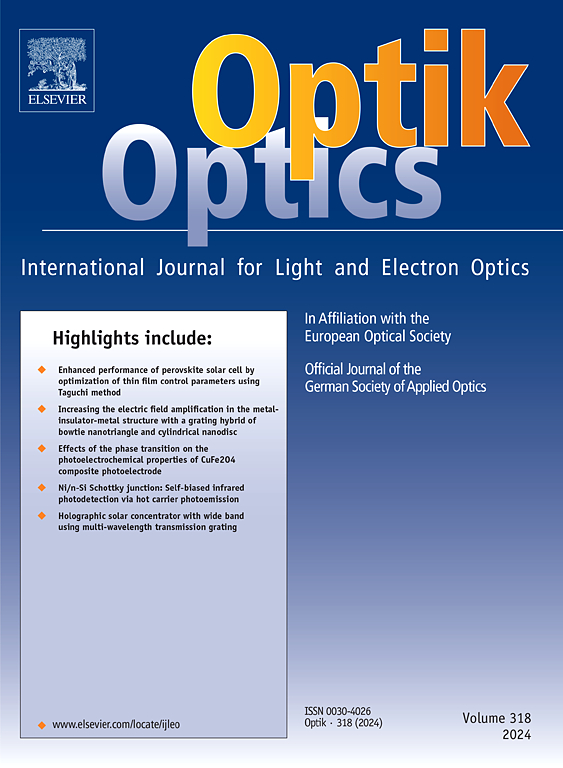Unveiling CsInTiO₄ quantum dots: A novel wide-band-gap material with exceptional nonlinear optical properties
IF 3.1
3区 物理与天体物理
Q2 Engineering
引用次数: 0
Abstract
A comprehensive detailed theoretical investigation into structural, optical, and optoelectronic properties of caesium indium titanate (CsInTiO₄) quantum dots (QDs), modelled with a unit cell size of approximately 15 Å. As a structural analogy of CsAlTiO₄, CsInTiO₄ crystallizes in a monoclinic phase with space group , as confirmed by X-ray diffraction (XRD) analysis. The material exhibits a wide optical band gap , classifying it as a robust wide-band-gap insulator. Optical dispersion behavior was analyzed using the Wemple-DiDomenico model, yielding a high single-oscillator energy () and oscillator strength of (), indicative of strong ionic character and electronic stability. Furthermore, nonlinear optical (NLO) characterization revealed a significant third-order susceptibility () and a high nonlinear refractive index (), highlighting the material’s strong nonlinear response. Such insights, supported by both theoretical simulations and XRD data, represent the 1st detailed exploration of CsInTiO₄-QDs, laying the ground for upcoming experiments. These numerical benchmarks not only establish CsInTiO₄-QDs as a wide-band-gap insulator but also underscore their exceptional potential for UV optoelectronic and nonlinear optical applications.
CsInTiO₄量子点:一种具有特殊非线性光学特性的新型宽带隙材料
对钛酸铯铟(CsInTiO₄)量子点(QDs)的结构、光学和光电子特性进行了全面详细的理论研究,模拟的单位电池尺寸约为15 Å。通过x射线衍射(XRD)分析证实,CsInTiO₄的结晶结构与CsAlTiO _4类似,为单斜相,具有空间基团(P21/N)。该材料显示出宽的光学带隙(5.33eV),将其归类为坚固的宽带隙绝缘体。利用wemule - didomenico模型分析了其光色散行为,得到了高单振子能量(E 0 =7.68eV)和振子强度(f=35.8eV²),表明其具有强离子特性和电子稳定性。此外,非线性光学(NLO)表征显示了显著的三阶磁化率(χ(3))和高非线性折射率(n2),突出了材料的强非线性响应。这些见解得到了理论模拟和XRD数据的支持,代表了对CsInTiO₄-QDs的第一次详细探索,为即将进行的实验奠定了基础。这些数值基准不仅确立了CsInTiO 4 -QDs作为宽带隙绝缘体的地位,而且强调了它们在紫外光电和非线性光学应用中的特殊潜力。
本文章由计算机程序翻译,如有差异,请以英文原文为准。
求助全文
约1分钟内获得全文
求助全文
来源期刊

Optik
物理-光学
CiteScore
6.90
自引率
12.90%
发文量
1471
审稿时长
46 days
期刊介绍:
Optik publishes articles on all subjects related to light and electron optics and offers a survey on the state of research and technical development within the following fields:
Optics:
-Optics design, geometrical and beam optics, wave optics-
Optical and micro-optical components, diffractive optics, devices and systems-
Photoelectric and optoelectronic devices-
Optical properties of materials, nonlinear optics, wave propagation and transmission in homogeneous and inhomogeneous materials-
Information optics, image formation and processing, holographic techniques, microscopes and spectrometer techniques, and image analysis-
Optical testing and measuring techniques-
Optical communication and computing-
Physiological optics-
As well as other related topics.
 求助内容:
求助内容: 应助结果提醒方式:
应助结果提醒方式:


